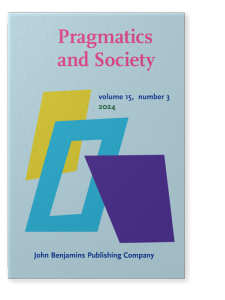Pragmatics and Society
Pragmatics and Society publishes its articles Online First.
Latest articles
22 March 2024
8 March 2024
13 February 2024
12 February 2024
22 January 2024
18 January 2024
22 December 2023
21 December 2023
18 December 2023
15 December 2023
1 December 2023
30 November 2023
6 November 2023
2 November 2023
30 October 2023
20 October 2023
17 October 2023
10 October 2023
25 September 2023
22 September 2023
21 August 2023
7 August 2023
27 July 2023
25 July 2023
6 July 2023
20 June 2023
12 June 2023
6 June 2023
30 May 2023
23 May 2023
10 May 2023
28 April 2023
21 April 2023
20 April 2023
18 April 2023
13 April 2023
11 April 2023
6 April 2023
3 April 2023
21 March 2023
14 March 2023
6 December 2022
4 November 2022
Issues
Online-first articlesVolume 15 (2024)
Volume 14 (2023)
Volume 13 (2022)
Volume 12 (2021)
Volume 11 (2020)
Volume 10 (2019)
Volume 9 (2018)
Volume 8 (2017)
Volume 7 (2016)
Volume 6 (2015)
Volume 5 (2014)
Volume 4 (2013)
Volume 3 (2012)
Volume 2 (2011)
Volume 1 (2010)
Board
Subscription Info
General information about our electronic journals.
Subscription rates
All prices for print + online include postage/handling.
| Online-only | Print + online | ||
|---|---|---|---|
| Volume 16 (2025): 6 issues; ca. 960 pp. | EUR |
EUR |
|
| Volume 15 (2024): 6 issues; ca. 960 pp. | EUR |
EUR |
Individuals may apply for a special online-only subscription rate of EUR
Private subscriptions are for personal use only, and must be pre-paid and ordered directly from the publisher.
Available back-volumes
| Online-only | Print + online | ||
|---|---|---|---|
| Complete backset (Vols. 1‒14; 2010‒2023) |
52 issues; 8,080 pp. |
EUR 3,336.00 | EUR 3,741.00 |
| Volume 14 (2023) | 6 issues; 960 pp. | EUR |
EUR |
| Volumes 12‒13 (2021‒2022) | 5 issues; avg. 800 pp. | EUR |
EUR |
| Volume 11 (2020) | 4 issues; 640 pp. | EUR |
EUR |
| Volume 10 (2019) | 4 issues; 640 pp. | EUR |
EUR |
| Volume 9 (2018) | 4 issues; 640 pp. | EUR |
EUR |
| Volume 8 (2017) | 4 issues; 640 pp. | EUR |
EUR |
| Volume 7 (2016) | 4 issues; 640 pp. | EUR |
EUR |
| Volume 6 (2015) | 4 issues; 640 pp. | EUR |
EUR |
| Volume 5 (2014) | 3 issues; 360 pp. | EUR |
EUR |
| Volume 4 (2013) | 3 issues; 360 pp. | EUR |
EUR |
| Volumes 1‒3 (2010‒2012) | 2 issues; avg. 320 pp. | EUR |
EUR |
Submission
Pragmatics and Society offers online submission .
Before submitting, please consult the guidelines and the Short Guide to EM for Authors .
If you are not able to submit online, or for any other editorial correspondence, please contact the editors via e-mail: daria.dayter
Easy Submission. We offer you an opportunity to submit your paper in any format or lay-out that can be used by referees to evaluate your manuscript. The paper should still contain sections, readable figures, and use a consistent citation style of your choice for reviewers' convenience. Only when your paper is at the revision stage will you be requested to put your paper in a correct format for acceptance and provide the high-resolution items required for the publication of your article.
Anonymization. This journal uses double blind peer review, which means the identities of the authors are concealed from the reviewers, and vice versa. To facilitate this, please ensure that the manuscript submitted for review does not contain your name on the title page. Please do not replace the authors' last names in in-text citations with 'Author'; it is sufficient to discuss such citations in the third person. Such replacement should only be made if it is absolutely necessary to refer to the work authors have previously undertaken and to identify it as belonging to the manuscript's authors (for instance, to cite an unpublished dataset).
Ethics
John Benjamins journals are committed to maintaining the highest standards of publication ethics and to supporting ethical research practices.
Authors and reviewers are kindly requested to read this Ethics Statement .
Please also note the guidance on the use of (generative) AI in the statement.
Rights and Permissions
Authors must ensure that they have permission to use any third-party material in their contribution; the permission should include perpetual (not time-limited) world-wide distribution in print and electronic format.
For information on authors' rights, please consult the rights information page.
Open Access
Articles accepted for this journal can be made Open Access through payment of an Article Publication Charge (APC) of EUR 1800 (excl. tax); more information can be found on the publisher's Open Access Policy page. There is no fee if the article is not to be made Open Access and thus available only for subscribers.
Corresponding authors from institutions with which John Benjamins has a Read & Publish arrangement can publish Open Access without paying a fee; information on the institutions and which articles qualify, can be found on this page.
For information about permission to post a version of your article online or in an institutional repository ('green' open access or self-archiving), please consult the rights information page.
Archiving
John Benjamins Publishing Company has an agreement in place with Portico for the archiving of all its online journals and e-books.
